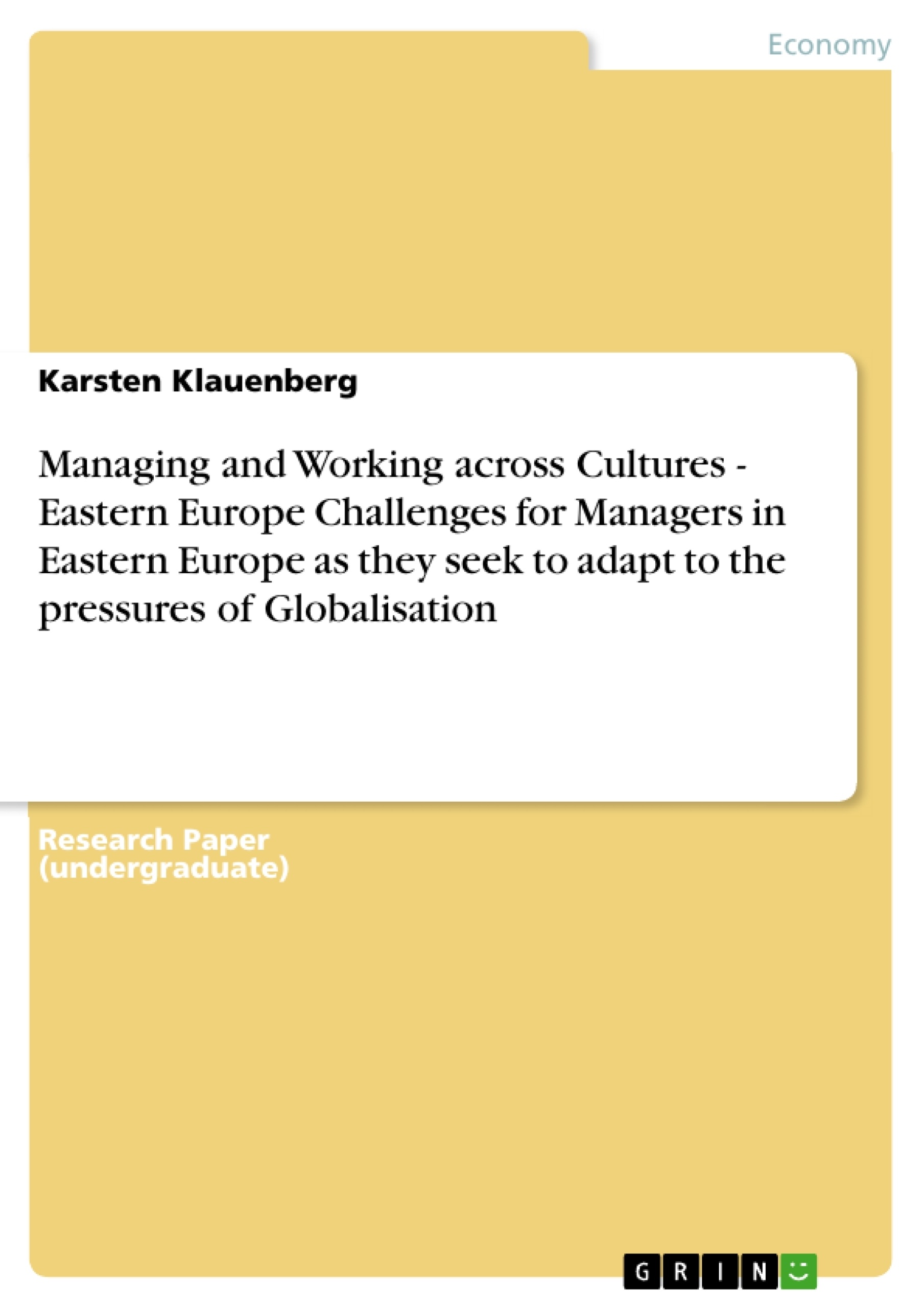Managers in Eastern Europe face a wide range of challenges and problems when they seek to adapt to the pressures of globalisation. This assignment focuses on challenges deriving from intercultural aspects, differences in management styles, the Das Assignment identifiziert und evaluiert die Pro
Inhaltsverzeichnis (Table of Contents)
- Introduction
- Challenges for Managers in Eastern Europe
- The Intercultural Challenge
- Intercultural Challenge and New Styles of Management
- Training to succeed on the Labour Market
- Mastering their own History
- Differences amongst Groups of Managers
- The Intercultural Challenge
- The Case Study
- Conclusion
Zielsetzung und Themenschwerpunkte (Objectives and Key Themes)
This assignment aims to explore the challenges faced by managers in Eastern Europe as they adapt to the pressures of globalization. The primary focus is on intercultural challenges, including differences in management styles, the need for training to succeed in the labor market, and the impact of historical context on managerial practices. The paper also examines the differences between groups of managers in the region.- Intercultural challenges in management styles
- The role of training and development in preparing managers for a globalized workforce
- The influence of history on managerial practices in Eastern Europe
- The diverse management styles across different groups of managers in Eastern Europe
- The practical application of these challenges through a case study of Renault in Novo Mesto
Zusammenfassung der Kapitel (Chapter Summaries)
- Introduction: This chapter provides an overview of the challenges faced by Eastern European managers in a globalized context. It highlights key areas of focus, including intercultural aspects, management style differences, training requirements, historical influences, and variations between manager groups. The chapter introduces the case study of Renault in Novo Mesto to illustrate the practical implications of these challenges.
- Challenges for Managers in Eastern Europe when they seek to adapt to the Pressures of Globalisation: This chapter examines the framework for understanding the challenges faced by local managers in Eastern Europe. It connects these challenges to the broader process of adapting to Western culture following the fall of communist regimes in 1989. The chapter emphasizes that while political systems transitioned quickly, economic and societal transformations require more time and generations.
- The Intercultural Challenge: This section focuses on the intercultural challenges faced by Eastern European managers working within multinational companies. It explores the need to adapt to Western management styles and potentially change their own styles.
- Intercultural Challenge and New Styles of Management: This section delves deeper into the specifics of the intercultural challenge by comparing the management styles of the communist era to the post-communist, market-oriented era. It analyzes the characteristics of "Red Executives" and explores the impact of centralized systems, bureaucratic procedures, and different understandings of honesty and integrity. The section also examines the challenges of decision-making, risk-taking, and strategy implementation within the context of a planned economy.
Schlüsselwörter (Keywords)
The primary keywords and focus topics of this assignment include: Eastern Europe, managers, globalization, intercultural challenges, management styles, training, history, case study, Renault, Novo Mesto. The assignment explores the impact of these factors on the adaptation of Eastern European managers to a globalized business environment.Frequently Asked Questions
What are the main challenges for managers in Eastern Europe?
Managers face intercultural challenges, the need to adapt to globalization, and the struggle to transition from communist-era management styles to market-oriented ones.
What is a "Red Executive"?
The term refers to managers from the communist era who operated within centralized, bureaucratic systems and often struggle with modern concepts of risk-taking and decision-making.
How does history influence management in Eastern Europe?
While political systems changed quickly after 1989, economic and societal transformations take generations, with historical bureaucratic procedures still impacting current practices.
What role does training play for these managers?
Training is essential to help managers succeed in the global labor market and to bridge the gap between different understandings of honesty, integrity, and strategy.
Which case study is used to illustrate these challenges?
The assignment examines the practical application of these challenges through a case study of Renault in Novo Mesto.
- Quote paper
- Karsten Klauenberg (Author), 2004, Managing and Working across Cultures - Eastern Europe Challenges for Managers in Eastern Europe as they seek to adapt to the pressures of Globalisation, Munich, GRIN Verlag, https://www.grin.com/document/185898



